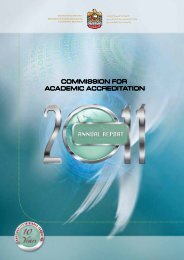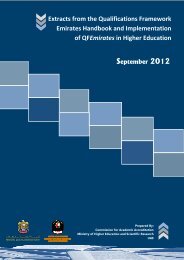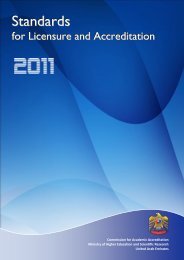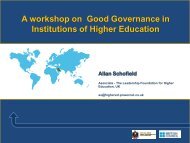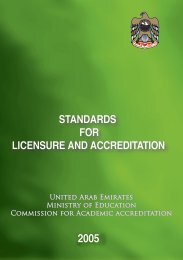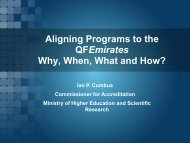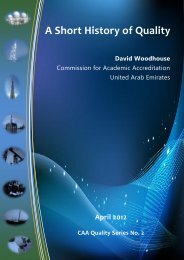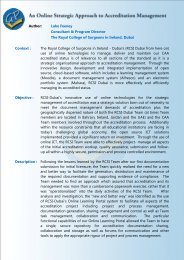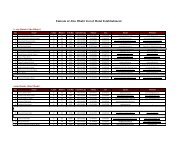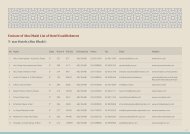to download the PowerPoint Presentation - CAA
to download the PowerPoint Presentation - CAA
to download the PowerPoint Presentation - CAA
You also want an ePaper? Increase the reach of your titles
YUMPU automatically turns print PDFs into web optimized ePapers that Google loves.
Grid of Level Descrip<strong>to</strong>rs<br />
Level Knowledge (Version 01022141) Skill Au<strong>to</strong>nomy and responsibility Self-development Role in context<br />
10<br />
comprehensive, deep and overarching knowledge at <strong>the</strong><br />
frontier of a field of work or learning and at <strong>the</strong> interface<br />
between different fields<br />
new knowledge, as judged by independent experts applying<br />
international standards, created through research or<br />
scholarship, that contributes <strong>to</strong> <strong>the</strong> development of a field of<br />
work or learning<br />
a range of advanced and specialised skills and techniques, including<br />
syn<strong>the</strong>sis, evaluation and reflection, required <strong>to</strong> extend and redefine<br />
existing knowledge or professional practice or <strong>to</strong> produce new and original<br />
knowledge<br />
advanced skills in developing innovative solutions <strong>to</strong> critical problems in<br />
research using highly developed cognitive and creative expert skills and<br />
intellectual independence <strong>to</strong> <strong>the</strong> field of work or learning<br />
highly developed expert communication and technology skills <strong>to</strong> present,<br />
explain and/or critique highly complex and diverse matters<br />
can act with substantial authority, creativity, au<strong>to</strong>nomy,<br />
independence, scholarly and professional integrity in a<br />
sustained commitment <strong>to</strong> <strong>the</strong> development of new ideas or<br />
processes or systems in challenging and novel work or study<br />
contexts<br />
can account for overall governance of processes and systems<br />
can lead action <strong>to</strong> build and transform socio-cultural norms<br />
and relationships<br />
can analyse and critique <strong>the</strong> state of learning in<br />
a field and contribute <strong>to</strong> its advancement<br />
can originate and manage complex professional<br />
processes<br />
can lead and take full responsibility for <strong>the</strong><br />
development and strategic deployment of<br />
professional teams and self<br />
9<br />
comprehensive, highly specialised knowledge in a field of work<br />
or learning and at <strong>the</strong> interface between different fields,<br />
including frontier concepts; including advanced knowledge of<br />
applicable research principles and methods<br />
critical awareness of knowledge issues, as <strong>the</strong> basis for original<br />
thinking; encompassing appropriate processes of enquiry and<br />
current processes of knowledge production<br />
detailed body of knowledge of recent developments in a field<br />
of learning or work and/or professional practice<br />
specialised skills required in research, analysis, evaluation and/or innovation<br />
of complex ideas, information, concepts and/or activities<br />
advanced problem-solving skills required <strong>to</strong> develop new knowledge and<br />
procedures and <strong>to</strong> integrate knowledge from different fields using highly<br />
developed cognitive and creative skills and intellectual independence <strong>to</strong> <strong>the</strong><br />
field of work or learning<br />
highly developed specialist communication and technology skills <strong>to</strong> present,<br />
explain and/or critique highly complex matters<br />
can take responsibility for managing professional practice or<br />
work, processes or systems, or learning contexts that are<br />
complex, unpredictable and require new strategic approaches<br />
and/or intervention or conceptual abstract solutions<br />
can account for high level governance of processes and<br />
systems<br />
can analyse and reflect on socio-cultural norms and<br />
relationships and act <strong>to</strong> build and transform <strong>the</strong>m<br />
can self-evaluate and take responsibility for<br />
contributing <strong>to</strong> professional knowledge and<br />
practice, as well as implementing ethical<br />
standards and fur<strong>the</strong>r learning<br />
can initiate and manage professional activity<br />
can take responsibility for leading <strong>the</strong> strategic<br />
performance and development of professional<br />
teams and self<br />
8<br />
advanced or specialised knowledge and critical understanding<br />
in a specialised field of work or learning and at <strong>the</strong> interface<br />
between fields<br />
critical approach <strong>to</strong> a systematic and coherent body of<br />
knowledge and concepts gained from a range of sources<br />
problem-solving skills applied <strong>to</strong> a specialist field and <strong>the</strong> integration of<br />
knowledge from different fields of work or learning <strong>to</strong> solve complex<br />
unpredictable and/or abstract problems with intellectual independence<br />
critical selection of appropriate research <strong>to</strong>ols and strategies associated with<br />
<strong>the</strong> discipline field of work or learning<br />
highly developed advanced communication and technology skills <strong>to</strong> present,<br />
explain and/or critique substantively complex matters<br />
can take responsibility for developing and implementing new<br />
or creative approaches <strong>to</strong> managing complex work processes<br />
and organisation, resources or learning, including leading and<br />
managing teams within a technical or professional activity<br />
can work effectively as an individual or in team leadership<br />
contexts<br />
can express a comprehensive, internalised, personal world<br />
view, while accepting responsibility <strong>to</strong> society at large and <strong>to</strong><br />
socio-cultural norms and relationships<br />
can self-evaluate and take responsibility for<br />
contributing <strong>to</strong> professional practice and<br />
fur<strong>the</strong>r learning, in complex and sometimes<br />
unfamiliar learning contexts<br />
can lead, contribute and observe ethical<br />
standards<br />
can manage professional activity<br />
can take responsibility for leading <strong>the</strong> strategic<br />
performance of professional teams and self<br />
can coordinate peer relationships with qualified<br />
practitioners and lead multiple, complex groups<br />
7<br />
specialised factual and <strong>the</strong>oretical knowledge and an<br />
understanding of <strong>the</strong> boundaries in a field of work or learning,<br />
encompassing a broad and coherent body of knowledge and<br />
concepts, with substantive depth in <strong>the</strong> underlying principles<br />
and <strong>the</strong>oretical concepts<br />
familiarity with sources of new research and knowledge with<br />
integration of concepts from outside fields<br />
technical, creative and analytical skills appropriate <strong>to</strong> solving specialised<br />
problems using evidentiary and procedural based processes <strong>to</strong> predictable<br />
and new contexts associated with a field of work or learning, encompassing<br />
evaluating, selecting and applying appropriate methods, procedures or<br />
techniques in processes of investigation <strong>to</strong> identified solutions<br />
selection of appropriate research <strong>to</strong>ols and strategies associated with <strong>the</strong><br />
field of work or learning<br />
highly developed advanced communication and technology skills <strong>to</strong> present,<br />
explain and/or critique complex matters<br />
can take responsibility for developing new and advanced<br />
approaches <strong>to</strong> managing or evaluating complex and<br />
unpredictable work procedures and processes, resources or<br />
learning, including leading teams within a technical or<br />
professional activity<br />
can manage technical, supervisory or design processes in<br />
unpredictable contexts<br />
can work creatively and/or efficiently as an individual or in<br />
team leadership or managing contexts<br />
can express an internalised, personal view, and accept<br />
responsibility <strong>to</strong> society at large and <strong>to</strong> socio-cultural norms<br />
and relationships<br />
can self-evaluate and take responsibility for<br />
contributing <strong>to</strong> professional practice and<br />
fur<strong>the</strong>r learning<br />
can manage learning tasks independently and<br />
professionally, in complex and sometimes<br />
unfamiliar learning context<br />
can take initiative <strong>to</strong> address learning needs<br />
and function independently within learning<br />
groups<br />
can contribute and observe ethical standards<br />
can function with full au<strong>to</strong>nomy in technical and<br />
supervisory contexts and adopt professional roles<br />
with little guidance<br />
can take responsibility for <strong>the</strong> setting and<br />
achievement of group or individual outcomes and<br />
for <strong>the</strong> management and supervision of <strong>the</strong> work of<br />
o<strong>the</strong>rs or self in <strong>the</strong> case of a specialisation in field<br />
of work or learning<br />
can take responsibility for managing <strong>the</strong><br />
professional development of individuals and groups<br />
can participate in peer relationships with qualified<br />
practitioners and lead multiple, complex groups<br />
6<br />
comprehensive, specialised factual knowledge and an<br />
understanding of <strong>the</strong> boundaries in a field of work or learning,<br />
encompassing a broad and coherent body of knowledge and<br />
concepts, with depth in <strong>the</strong> underlying understanding of <strong>the</strong><br />
principles and concepts<br />
familiarity with sources of existing knowledge and <strong>the</strong><br />
integration of concepts from outside fields<br />
specialist technical, creative and conceptual skills appropriate <strong>to</strong> solving<br />
complex problems associated with a field of work or learning<br />
a comprehensive range of specialist cognitive and practical skills appropriate<br />
<strong>to</strong> planning and implementing solutions <strong>to</strong> varied, unpredictable and<br />
unfamiliar problems within a field<br />
identification and use of appropriate research <strong>to</strong>ols and strategies<br />
associated with <strong>the</strong> field of work or learning<br />
advanced communication and technology skills <strong>to</strong> present, explain and/or<br />
critique complex matters<br />
can take responsibility for developing appropriate approaches<br />
<strong>to</strong> managing complex work procedures and processes,<br />
resources or learning, including leading teams within a<br />
technical or professional activity<br />
can manage technical, supervisory or design processes in<br />
varied, unpredictable and unfamiliar contexts<br />
can work effectively as a specialist role or in team leadership<br />
contexts<br />
can express an internalised, personal world view, reflecting<br />
engagement in society at large and in socio-cultural<br />
relationships<br />
can take initiative <strong>to</strong> address learning needs<br />
and function independently within learning<br />
groups<br />
can support and observe ethical standards<br />
can evaluate own learning and identify learning<br />
needs in a familiar and unfamiliar environment<br />
can function with full au<strong>to</strong>nomy in technical and<br />
supervisory contexts and adopt professional roles<br />
under guidance<br />
can take responsibility for <strong>the</strong> setting and<br />
achievement of group outcomes and for <strong>the</strong><br />
supervision of <strong>the</strong> work of o<strong>the</strong>rs<br />
can take responsibility for managing <strong>the</strong><br />
development of individuals and groups<br />
can participate in peer relationships with qualified<br />
practitioners and lead multiple groups<br />
5<br />
comprehensive, specialised knowledge within a broad field of<br />
work or learning, including an understanding of <strong>the</strong> underlying<br />
<strong>the</strong>oretical and abstract concepts with significant depth in<br />
some areas<br />
technical, creative and conceptual skills appropriate <strong>to</strong> solving a range of<br />
problems associated with a field of work or learning<br />
a comprehensive range of specialist cognitive and practical skills appropriate<br />
<strong>to</strong> identifying and implementing solutions <strong>to</strong> familiar and non-routine<br />
problems within a field<br />
use of appropriate research <strong>to</strong>ols and strategies associated with <strong>the</strong> field of<br />
work or learning<br />
comprehensive communication and technology skills <strong>to</strong> present, explain<br />
and/or critique complex matters<br />
can take responsibility for coordinating <strong>the</strong> implementation of<br />
appropriate approaches <strong>to</strong> complex work procedures and<br />
processes, resources or learning, including leading teams<br />
within a technical or paraprofessional activity<br />
can exercise coordination and/or supervision in routine,<br />
familiar and some non-routine work or learning contexts<br />
can coordinate technical, supervisory or design processes in<br />
routine, familiar and non-routine contexts<br />
can express an internalised, personal world view, in <strong>the</strong> context<br />
of an understanding of socio-cultural relationships<br />
can take responsibility for own learning within a<br />
managed and non-routine environment<br />
can comprehend and observe ethical standards<br />
can evaluate own learning and identify learning<br />
needs in a developed environment<br />
can function with au<strong>to</strong>nomy in technical and<br />
coordination contexts and support professional and<br />
adopt paraprofessional roles under guidance<br />
can function both independently and in a<br />
coordination role within multiple groups<br />
can take responsibility for coordinating <strong>the</strong><br />
development of individuals and groups<br />
can review and develop <strong>the</strong> performance of self and<br />
o<strong>the</strong>rs<br />
9/22/2011<br />
45



